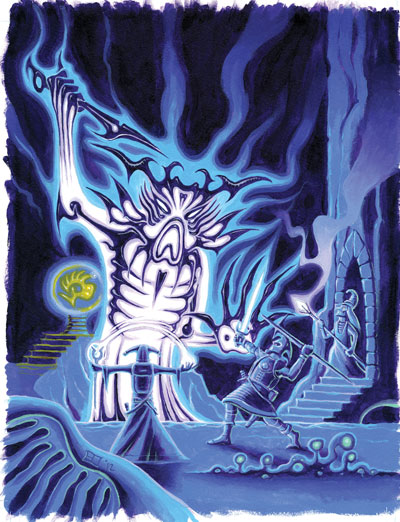Baseline rules are S&W Complete.
Character Creation
- All classes in S&W Complete available
- Theorems & Thaumaturgy classes (elementalist, necromancer, vivimancer) available
- Clerics renamed Demon Hunters and use the LotFP cleric spells
- 3d6 six times for ability scores
- No class ability score requirements
- No mods (bonus to AC, attack rolls, HP, etc) from ability scores
- Magic-users use the Dying Earth spells
- Class HD adjusted: d4 increased to d6, fighter HD is d10
- No weapon restrictions, weapon damage = class HD
- Spells learned only on level up (odd: random, even: pick)
- Spell casting classes begin with 3 spells (no preparation, each may be cast)
- Modified assassin class (d8 HD, poison-craft rules)
- Starting background & equipment from Warhammer 1E (roll 1d100) + 1d6 SP
Other Rules
- Silver standard for XP, prices remain as S&W Complete
- XP will also be earned for defeating chaotic monsters
- Save or die at 0 HP (success = unconsciousness)
- Carrying capacity (equipment slots) = strength score
- Equipment takes wear when rolling <= quality (default quality = 3)
- Level limit = 10 (or lower for demi-humans, as per the rulebook)
- Armor beyond class standards imposes penalties to all physical rolls
- Enchanted equipment does not grant bonuses to rolls (but deals magic damage)
- To recover, take a downtime action in a safe place and re-roll all HD.
Physical rolls include attacks, physical ability checks, and physical saving throws.
Encumbrance will be super strict and simple. Yes one torch or one dagger takes a slot (same as a spear or greatsword).
I will likely tweak the stranger classes a bit, so be prepared for that (for example, no dumb shit like rangers getting 2 hit dice at level 1), but I don’t want to clutter up the main list of house rules (which is happily short right now) with that stuff.
Level 1 Demon Hunter Spells
- Bless
- Command
- Cure Light Wounds*
- Detect Evil*
- Invisibility to Undead*
- Protection from Evil*
- Purify Food & Drink*
- Remove Fear*
- Sanctuary
- Turn Undead
Check the revised Lamentations rules for descriptions.

S&W Complete revised cover (lifted from here)
- 2013-12-17 edit: added recovery rule.
- 2013-12-20 edit: modified cleric spell total, link to assassin class

I love looking a people’s house rules! Two questions:
1) Okay, so if they don’t provide bonuses to the usual stuff, what are ability scores for? Are you going to use them as a “roll under” number for actions?
2) I see that there are no weapon restrictions…are there armor restrictions?
@Jack
Re: ability scores: exactly. Catch the scroll before it’s blown away by the wind? Dexterity check. Resist taking penalties from Grendel’s foetid stench? Constitution check. Get a retainer to take a risky action? Charisma check. Etc. Also contested checks for grappling.
There are no strict armor restrictions, but if you use armor better than that normally available to your class, you take a penalty to all physical actions equal to the difference (in steps) from that baseline armor assumption. So a magic-user walking around in plate is going to be -3 at all physical saving throws, attack rolls, and ability checks. A thief in the same situations would be at -2.
For that armor thing it’s really the initiative check that kills – you won’t be getting that sleep spell off timely…
Hah, the one and only house rule I would use in Beyond the Wall is exactly what you describe for armor. Great minds think alike.
I like rangers getting two hit dice at first level. In fact, it was one of the factors that helped me decide that the OD&D method of allocating hit dice is far superior to the once used in later versions. Empire of the Petal Throne also lets some characters start with 2 or even 3 hit dice.
@Aaron
What do you mean by OD&D method of allocating hit dice? The Strategic Review writeup of the ranger specifies that d8 HD should be used if that is what fighters are using (meaning that the rules are proto-AD&D).
Why give rangers 2 HD? Why not clerics, or any other class? It’s just too big of a starting difference for me. Coupled with the other ranger abilities, it’s almost like rangers start as second level characters (or higher), and I can’t see why. It also eliminates (or at least mitigates) the first level experience of “can be killed by one hit” that is important to the atmosphere of many games that I run.
You’ll also note that some of the other adjustments I made with these house rules are slanted toward decreasing starting variability (for example, the no bonuses from ability scores rule), which would make multiple hit dice stand out all the more.
The point isn’t the ranger, but the idea that hit dice can be totally independent of level. You could start at one and go up quickly or start at 4 and go up slowly. You have total freedom to do whatever you want; up down or stay the same, You aren’t stuck with 5 possible die choices.
If you’re trying to reduce starting variability, then the OD&D method is even better as all classes start out with one hit die; with the fighter gaining a single bonus hit point.
This is true, though in the end I think it’s all about expected values. The OD&D starting values work well (for me) because they are all so close together. I think d6 should be the lowest HD (rather than d4) if it is supposed to represent the “standard” person, and this falls out of the 3 LBB approach naturally.
I do really like the “all six-sided dice, with bonuses for intermediate steps” 3 LBB method, though I prefer my “rationalized” progression to the progressions provided in OD&D.
http://www.necropraxis.com/2013/03/19/rationalized-hit-dice/
Pingback: Finchbox Rules | Critical Grumble